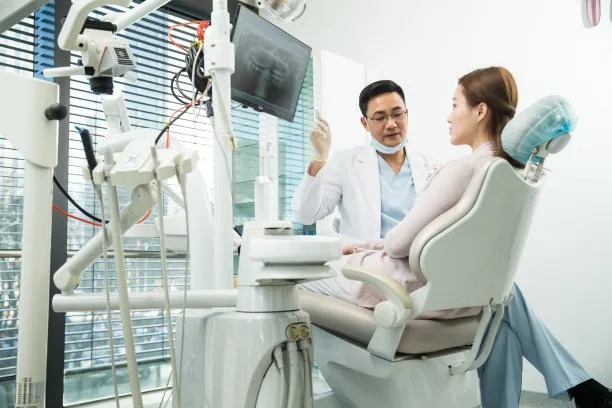Summary: Dental health is an integral part of overall wellbeing, and tooth extraction plays a crucial role in maintaining this balance. While the decision to extract a tooth can be daunting, it is sometimes necessary to prevent further complications, alleviate pain, and promote better oral health. This article will explore four important aspects of tooth extraction: the prevention of dental disease, the alleviation of pain and discomfort, the enhancement of functionality and aesthetics, and the overall impact on general health. Understanding these facets can help individuals recognize the significance of tooth extraction as a proactive measure rather than a mere last resort.
1. Prevention of Dental Disease

Tooth extraction is often a necessary step in preventing the spread of dental diseases. When a tooth is severely decayed or infected, it can compromise the health of surrounding teeth and gum tissue. By removing the problematic tooth, dentists can halt the progression of disease, protecting the integrity of adjacent structures.
Furthermore, wisdom teeth often lack sufficient space in the mouth, leading to potential overcrowding and improper alignment of other teeth. Extracting these extra teeth can prevent complications such as impaction, infection, and misalignment, helping individuals maintain optimal dental health.
Additionally, tooth extraction can prevent the development of systemic issues associated with dental diseases. Infections originating in the mouth can enter the bloodstream, potentially leading to conditions such as heart disease and diabetes. Thus, timely extraction mitigates these risks, promoting overall well-being.
2. Alleviation of Pain and Discomfort
Pain is often one of the primary reasons individuals seek dental treatment. Chronic tooth pain resulting from infections, abscesses, or decay can significantly impact daily life. Extracting the affected tooth can provide immediate relief and improve an individual’s quality of life.
Moreover, removing a tooth that is causing excessive discomfort eliminates the need for ongoing, potentially invasive treatments. In cases where the tooth is beyond saving, extraction is typically a more straightforward solution, allowing for quicker recovery and a return to normal activities.
Its also important to note that psychological wellbeing is closely linked to physical health. The stress of living with dental pain can lead to anxiety and depression. By resolving the source of discomfort through tooth extraction, individuals can experience an essential rejuvenation of both physical health and mental clarity.
3. Enhancement of Functionality and Aesthetics
Tooth extraction can also enhance both the functionality and aesthetics of a person’s smile. In cases of overcrowding, removing one or more teeth can create the necessary space for alignment and proper functioning of the remaining teeth. This can lead to a more effective bite and reduced wear on teeth.
Aesthetically, individuals may choose to extract teeth that are severely damaged or discolored, replacing them with implants or bridges that can restore beauty and confidence in one’s smile. A healthy and attractive smile can have a profound impact on self-esteem and social interactions.
Additionally, healthier teeth following extraction can lead to improved nutrition and overall health. When individuals can chew more effectively, they are more likely to consume a balanced, nutritious diet, supporting their general wellbeing.
4. Overall Impact on General Health
An often overlooked aspect of dental health is its connection to overall health. Poor dental hygiene and untreated dental diseases can lead to systemic health problems, including respiratory infections and cardiovascular issues. Extracting a problematic tooth can therefore serve as a crucial step in safeguarding against these potential health crises.
Moreover, dental infections can create a chronic inflammatory state in the body. By addressing these issues through extraction, individuals can foster a healthier internal environment, reducing the risk of other diseases.
Finally, maintaining good dental health through procedures like tooth extraction can lead to increased longevity and improved quality of life. Individuals who prioritize their dental health are likely to experience fewer health complications as they age, demonstrating the crucial link between oral and overall health.
Summary:
In summary, extracting a tooth is not merely a routine procedure; it is a vital component in maintaining dental health and overall well-being. From preventing the spread of disease to alleviating pain, enhancing functionality, and impacting general health, the significance of tooth extraction cannot be overstated. By understanding these key aspects, individuals can make informed decisions that support their long-term health.
This article is compiled by Vickong Dental and the content is for reference only.
Vickong Dental
Vickong Dental is a large medical group established in Hong Kong in 2008 by professors from well-known medical universities in Guangdong and Hong Kong, as well as medical doctors from key national '985' universities (including Master's supervisors and senior professors). The chain of branches brings together expert dentists with PhDs and Master's degrees from Hong Kong and Mainland China, committed to providing high-quality dental treatment.
"Vickong Dental Practices the University Motto of 'Healing and Serving Society,' with a Stable Operation for Sixteen Years. It Has Been honored with Hong Kong Enterprise Leaders's Choice,' and is a Global Trusted Implant Center for the Nobel Implant System. Recommended by Hong Kong Metro Broadcast and Guangdong Television, it Serves Customers from Over Thirty Countries and Regions, Gaining the Trust and Favor of Citizens from the Guangdong-Hong Kong-Macau Greater Bay Area and Surrounding Cities.

Thousands of customers' unanimous praise
The most recognized and highly recommended dental service by customers in the Guangdong-Hong Kong-Macau Greater Bay Area
We Ensure You Receive Detailed Care and Attention Here
Hong Kong standards, Shenzhen prices, Your Trusted English-speaking dentists

Vickong Dental Medical-Grade Instrument Disinfection Process
Vickong Dental Medical-Grade Instrument Disinfection Process

Vickong Dental Chain: A Warm and Comfortable Environment for Treatment






Appointment Hours

Q&A
Why choose Vickong Dental?
Vickong Dental practices the university motto 「Medicine to Benefit Society」, with each branch bringing together highly qualified dentists with doctoral and master’s degrees from Hong Kong and the Mainland, and has maintained seventeen years of steady operation。Recipient of 「2024 Hong Kong Enterprise Leaders Brand」, 「2025 Hong Kong Enterprise Leaders Brand」, a Nobel Biocare Global Trusted Implant Center, and a brand recommended by Metro Radio Hong Kong and Guangdong TV。
To date, we have served customers from more than thirty countries and regions,earning exceptionally high word-of-mouth recognition and trusted recommendations from residents across the Guangdong-Hong Kong-Macao Greater Bay Area and surrounding cities
We have eight major branches in Zhuhai、Shenzhen,and a consultation and service assurance center in Hong Kong,so you can book a free consultation at any time for any questions,which is very reassuring.
If I do not accept the quotation after the CT scan, will I be charged??
No! As long as the actual treatment has not started, you will not be charged any fees.
Will there be any additional charges during the treatment process?
No, there won’t be any additional charges. Before treatment begins, we will clearly explain the treatment plan and its corresponding fees. Only after the patient agrees and signs the consent form will we proceed with the dental service.
Can I pay in Hong Kong dollars?
Yes. Vickong Dental accepts payment in Hong Kong dollars. The amount will be converted based on the exchange rate of the day, and the applicable rate will be clearly communicated to you in advance.
Can I reschedule my appointment at any time?
Yes. Please contact us via **WeChat** or **WhatsApp** as early as possible, providing your original appointment time and details, along with your preferred new date and time slot for rescheduling.













